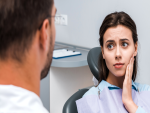
10 Tips for Oral Health and Pregnancy
- An oral health tip for vomiting associated with morning sickness is to rinse your mouth out afterward with 8 oz of water mixed with 1 tsp of baking powder to help neutralize acid. Wait 30 minutes before brushing your teeth.
- Avoiding tobacco and alcohol throughout your pregnancy is important for a healthy pregnancy. If you need help quitting tobacco use, talk with your health care provider or call 1-800-QUIT-NOW (1-800-784-8669). If you prefer texting for help, https://smokefree.gov/
- Healthy nutrition is even more important when you are eating for two. If possible, choose low-sugar snacks like yogurt, cheese, nuts or veggies, which are better for your oral health. Limit or avoid sugary beverages, candy and sweet treats.

- Keep up with your routine dental visits. Even if you haven’t been to the dentist in a while, schedule a visit during your pregnancy. Dental care is safe during pregnancy, including dental X-rays.
- The increase in certain pregnancy hormones can cause increased blood flow to gum tissue resulting in swelling of gums and bleeding with brushing or flossing. This is sometimes known as pregnancy gingivitis. Continue to brush twice daily with a fluoride-containing toothpaste, floss daily and see your dental provider if you have concerns.
- Heartburn is common as pregnancy progresses. Did you know that frequent exposure to stomach acid can affect your tooth enamel? You can minimize heartburn by avoiding acidic foods and drinks, eating smaller, frequent meals and avoiding late night eating.
- Chewing sugarless gum can be a tooth-healthy treat. Some sugarless gum brands contain xylitol which can deter the growth of cavity-causing bacteria.
- Periodontal disease is an inflammatory dental process that has been associated with pregnancy complications, including preterm delivery. Periodontal disease can also cause teeth to become loose and fall out. Regular dental care and healthy habits can help protect you from developing periodontal disease.
- Taking care of your oral health during pregnancy helps you AND your future baby. Children born to people with poor oral health have an increased risk of cavities.
- Once your baby arrives, you can help start them on a path to good oral health by taking care of your own oral health and starting a home hygiene routine by wiping their gums off after feedings. When teeth make their appearance, brushing with a rice-grain size of fluoride-containing toothpaste will help keep them cavity free. And, get your baby to the dentist for their first dental appointment by their first birthday.
This information in this post is for general educational purposes only and does not warrant or represent any information as related to health as specifically appropriate for you. It is not intended to be medical advice or replace the relationship that you have with your health care providers. You should always seek medical advice on any diagnosis or treatment from a qualified health care provider. The information is provided “as is” without any representations or warranties, express or implied.







